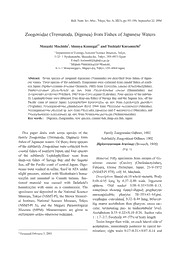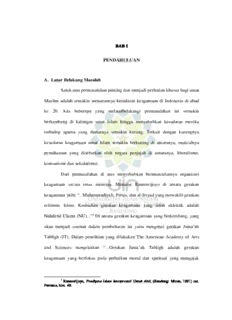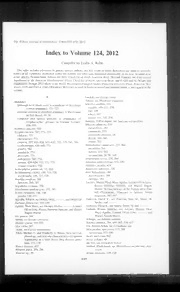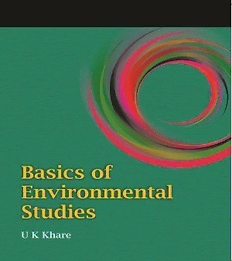
Basics of Environmental Studies PDF
Preview Basics of Environmental Studies
About the Author Dr Umesh Kumar Khare is presently working as Associate Professor in Civil Engineering Department at Government Engineering College, Dahod (Gujarat). He obtained his BE (Civil) degree with honours from Harisingh Gour University, Sagar in 1992. He was awarded with gold medal in BE (Civil) for achieving the highest marks in the university. He did his post graduation in 1994 from M S University, Baroda in Environmental Engineering and completed PhD from IIT Kanpur in June 2008. He joined as a lecturer in Civil Engineering Department at L D College of Engineering, Ahmedabad in 1995 through GPSC where he has been teaching and guiding students of Civil Engineering on projects work based on water and wastewater treatment and irrigation structures, for the last 15 years. He has also been teaching subjects like Environmental Studies, Surveying, Computer Programming and Utilisation, Environmental Engineering-I and II, and Irrigation Engineering. Dr Khare has published three papers in international journals and international and national conferences, respectively. He is currently acting as a reviewer in several international and national journals. U K Khare Associate Professor Civil Engineering Department Government Engineering College DAHOD, Gujarat McGraw Hill Education (India) Private Limited New Delhi McGraw Hill Education Offices New Delhi New York St louis San Francisco Auckland Bogotá Caracas Kuala lumpur lisbon london Madrid Mexico City Milan Montreal San Juan Santiago Singapore Sydney Tokyo Toronto McGraw Hill Education (India) Private Limited Published by McGraw Hill Education (India) Private Limited P-24, Green Park Extension, New Delhi 110 016 Basics of Environmental Studies Copyright © 2014, (2011–2013), by McGraw Hill Education (India) Private Limited. No part of this publication may be reproduced or distributed in any form or by any means, electronic, mechanical, photocopying, recording, or otherwise or stored in a database or retrieval system without the prior written permission of the publishers. The program listing (if any) may be entered, stored and executed in a computer system, but they may not be reproduced for publication. This edition can be exported from India only by the publishers, McGraw Hill Education (India) Private Limited. ISBN (13): 978-9-35-134283-0 ISBN (10): 9-35-134283-2 Vice President and Managing Director: Ajay Shukla Head—Higher Education Publishing and Marketing: Vibha Mahajan Publishing Manager—SEM & Tech. Ed: Shalini Jha Editorial Executive: Nimisha Kapoor Copy Editor: Preyoshi Kundu Manager—Production Systems: Satinder S Baveja Production Executive: Anuj K Shriwastava Assistant General Manager—Higher Education (Marketing): Vijay Sarathi Senior Product Specialist—SEM & Tech Ed: Sachin Tripathi General Manager—Production: Rajender P Ghansela Production Manager—Reji Kumar Information contained in this work has been obtained by McGraw Hill Education (India), from sources believed to be reliable. However, neither McGraw Hill Education (India) nor its authors guarantee the accuracy or completeness of any information published herein, and neither McGraw Hill Education (India) nor its authors shall be responsible for any errors, omissions, or damages arising out of use of this information. This work is published with the understanding that McGraw Hill Education (India) and its authors are supplying information but are not attempting to render engineering or other professional services. If such services are required, the assistance of an appropriate professional should be sought. Typeset at Text-o-Graphics, B-1/56, Aravali Apartment, Sector-34, Noida 201 301, and printed at Cover: A P Offset RADQCRCCRCDZC Dedicated to… My beloved parents Contents Preface ix 1. Introduction to Environment 1.1-1.24 1.1 Introduction 1.2 1.2 Environment – Meaning and Components 1.2 1.3 Man and Environment Relationship 1.10 1.4 Relation Between Anthropogenic Activities and Environment 1.13 1.5 Environmental Degradation 1.15 Case Studies 1.19 Important Terminology 1.19 Review Questions 1.20 Objective Type Questions 1.21 GTU Examination Questions 1.23 2. Ecology and Ecosystems 2.1-2.41 2.1 Introduction 2.2 2.2 Ecology and its Classification 2.2 2.3 Ecosystem and its Components 2.4 2.4 Food Chains 2.10 2.5 Food Webs 2.13 2.6 Biogeochemical Cycles 2.14 2.7 Major Ecosystems 2.21 2.8 Ecological Pyramids 2.31 Case Studies 2.35 Important Terminology 2.36 Review Questions 2.36 Objective Type Questions 2.37 GTU Examination Questions 2.40 3. Population and Natural Resources 3.1-3.62 3.1 Introduction 3.2 3.2 Habitation Patterns 3.2 viii Contents 3.3 Natural Resources 3.19 3.4 Main Natural Resources 3.23 3.5 Food Production 3.54 Case Studies 3.55 Important Terminology 3.56 Review Questions 3.57 Objective Type Questions 3.58 GTU Examination Questions 3.60 4. Environmental Pollution 4.1-4.64 4.1 Introduction 4.2 4.2 Pollutants and their Classification 4.2 4.3 Types of Environmental Pollution 4.4 4.4 Water Pollution 4.4 4.5 Air Pollution 4.23 4.6 Land Pollution 4.41 4.7 Noise Pollution 4.44 4.8 Current Environmental Global Issues 4.46 Some Local and International Disasters 4.57 Case Studies 4.57 Important Terminology 4.58 Review Questions 4.59 Objective Type Questions 4.60 GTU Examination Questions 4.63 Bibliography B.1 Preface We and our surrounding constitute the environment. Human activities have been interfering with nature since the beginning of civilisation on earth. Population explosion, rapid industrialisation and urbanisation have degraded the environment by polluting air, water and land. Thus, the impact of technology and development have caused numerous global environmental problems and various climatic changes. At international levels, various steps have been taken to reduce the impact of human activities on the environment. In 2009, President of Maldives and his cabinet arranged an underwater meeting to highlight the threat of climate change and demanded global cuts in the carbon emissions to be presented in the UN climate summit. Most importantly, people at large need to be made aware about the consequences of environmental problems in order to make such efforts successful. Therefore, basic knowledge of environment is very essential for every human being. Keeping this aspect in mind, the University Grants Commission (UGC) has mandated to include a core module syllabus of environmental studies in all undergraduate courses. About the book This book entitled Basics of Environmental Studies is written for studying a first course in the subject. It will be a useful read for all first year engineering students. The present book is an attempt to impart basic knowledge of environment to the readers and students not only from the examination point of view but also acquire skills to motivate the common public for developing a sense of responsibility towards the environmental protection. The book is organised into four chapters: 1. Introduction to Environment: This chapter includes components of environment, ecological factors influencing environment, the interaction between man and environment, importance of environmental education and environmental degradation. The emphasis has been given on the impact of advancement and technology on the environment. 2. Ecology and Ecosystems: This chapter describes the structure and functions of ecosystem, biogeochemical cycles, food chains and food web with examples and all three types of ecological pyramids. The chapter ends with detailed description of all major types of ecosystems. 3. Population and Natural Resources: This chapter describes the habitation pattern, population growth, population structure and demographic projections. The chapter also includes the detailed description of main natural resources, Indian scenario of all these resources and the problems caused due to over-exploitation of natural resources. x Preface 4. Environmental Pollution: This chapter describes air pollution, water pollution, land pollution and noise pollution. The emphasis was given to the main global environmental problems like global warming, green house effect, acid rain and depletion of ozone layer. Salient Features of the Book The contents of the book are full of thorough, comprehensive and broad ideas related to the subject matter. The salient features of the book are given below. Every concept has been explained in a lucid manner and the text is written in student- friendly language to make comprehension easy for nonenglish medium students also Includes systematic and simplified diagrams, graphs, pictures and examples Startling facts/notes on the environmental issues within the chapters, especially in the separate boxes, increase general awareness of students Case studies related to problems faced at national and international levels have been included at the end of each chapter Lists important terminology for quick reference Comprehensive pedagogy Review Questions: 47 Multiple Choice Questions: 94 The author hopes that the present book will be very useful to the readers, especially to the students to understand the subject with completeness without any need to refer to other books. Acknowledgements Dr Khare is heartily thankful to all those environmentalists whose ideas and opinions helped him while writing the book. He is also thankful to the Principal, HOD (Civil) and his colleagues of Government Engineering College, Dahod for their support and encouragement as well as to his friends specially Dr R K Jain who have supported and encouraged him during the preparation of the script. Dr Khare would specially like to express his thanks to his father-in-law Dr D P Srivastava for his constant inspiration and encouragement. At last, the author acknowledges the immense indirect contribution of his wife, Aparna and their two sons, Pearl and Nimit for their continuous support. The author is grateful to the reviewer mentioned below for sharing his valuable feedback: Jadavji Patel—BVM Engineering College, Vallabh Vidyanagar Dr Khare would also like to thank the team at McGraw-hill Education (India) Private Limited for their sincere efforts to publish this book. Umesh Kumar Khare
The list of books you might like

What Happened to You?

A Thousand Boy Kisses

Corrupt (Devil's Night #1)

Better Than the Movies

Premesse a Cassandra
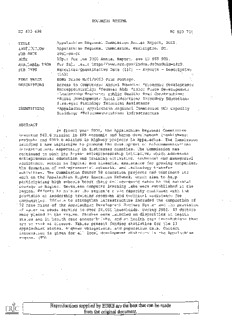
Appalachian Regional Commission

Yoga for Wellness: Healing with the Timeless Teachings of Viniyoga

Tartine Book № 2
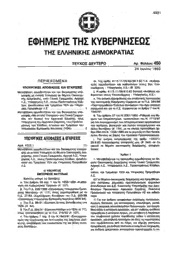
Greek Government Gazette: Part 2, 1993 no. 450
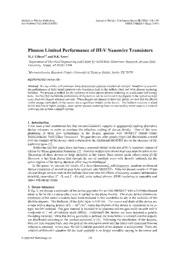
DTIC ADA464547: Phonon Limited Performance of III-V Nanowire Transistors

Optimum 1993 - 1994: Vol 24 Index

Hera
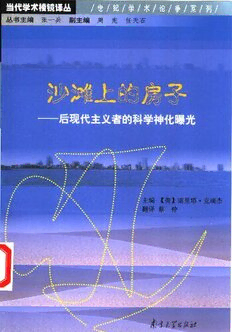
沙滩上的房子: 后现代主义者的科学神话曝光 (A House Built on Sand: Exposing Postmodernist Myths About Science)
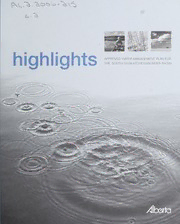
Highlights : approved water management plan for the South Saskatchewan River Basin

Drug Targeting Organ-Specific Strategies
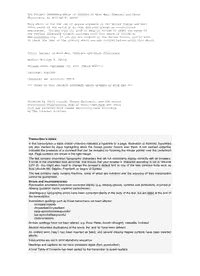
Secrets of Wise Men Chemists and Great Physicians by Wm K David
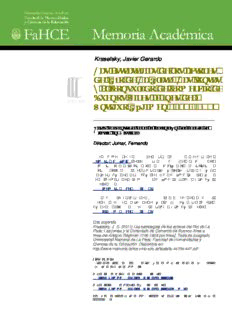
Las juntas y el Consulado de Comercio de Buenos Aires a fines del Antiguo R

The 2014 MosT MeMorable New ProducT lauNch survey

THE HISTORY OF DON QUIXOTE By Cervantes Vol I Part 8

Ana Awakens
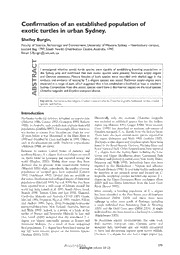
Confirmation of an established population of exotic turtles in urban Sydney
